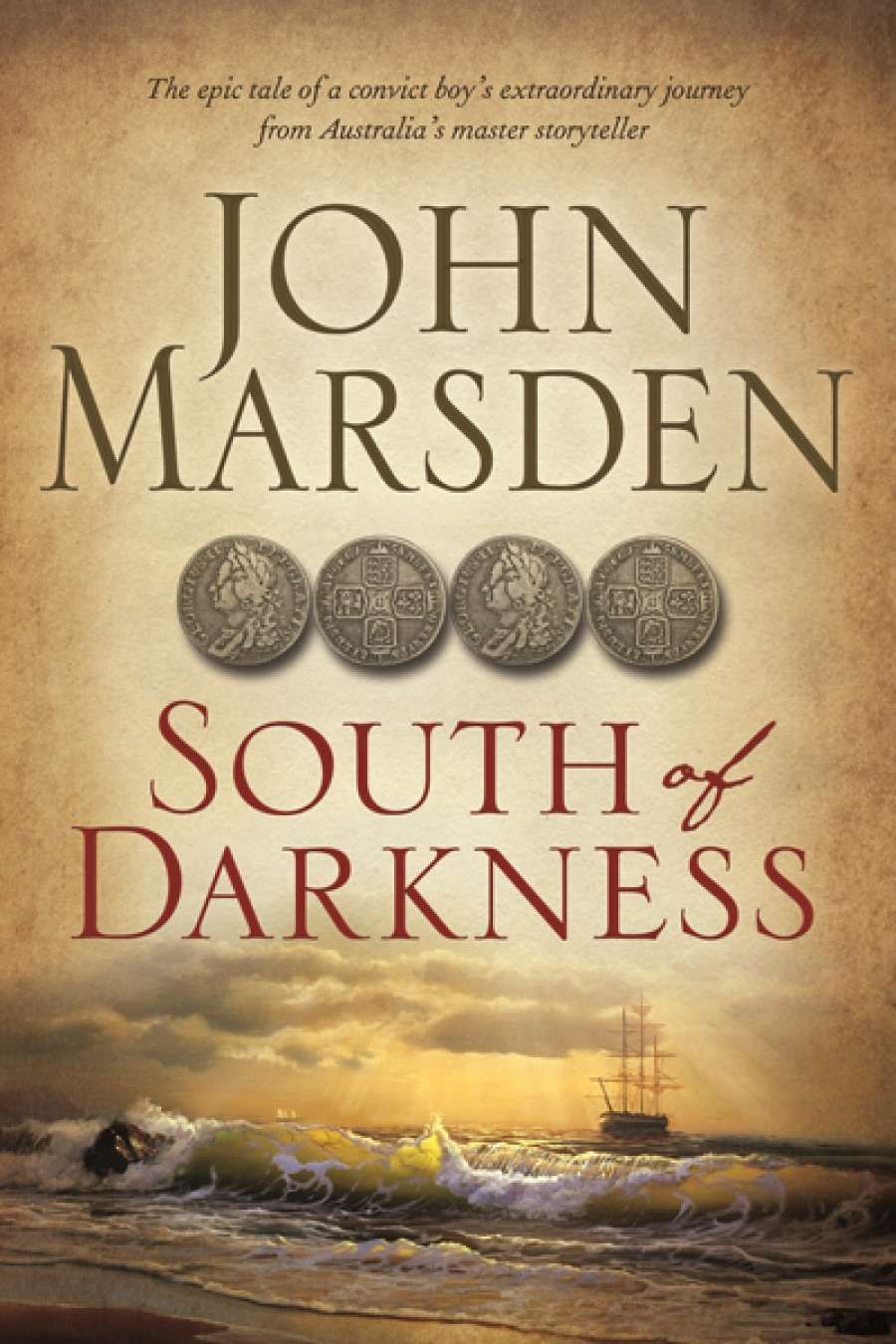
- Free Article: No
- Contents Category: Fiction
- Custom Article Title: Ruth Starke reviews 'South of Darkness' by John Marsden
- Review Article: Yes
- Online Only: No
- Custom Highlight Text:
It is sobering to think that the thousands of teenagers who in 1987 eagerly devoured John Marsden’s first novel, So Much To Tell You, and sent it and the author spinning into bestsellerdom are now in their forties – and as such, the target readership for his first adult novel, South of Darkness, a transportation saga that covers some familiar ground with a light tread.
- Book 1 Title: South of Darkness
- Book 1 Biblio: Macmillan, $39.99 hb, 375 pp
The ghost of Charles Dickens can be felt hovering over the story of Barnaby Fletch, a poor orphan boy abandoned at a tender age amid the slums of London’s East Smithfield towards the end of the 1700s, who eventually falls foul of the law and ends up on a convict ship bound for Botany Bay. The adult Barnaby is the narrator:
Having been asked by the Revd Mr Johnson to jot down a few notes about my upbringing and the manner of my arrival in the colony, I will attempt to do so, but I should say at the outset that I have little of interest to relate. I have not contributed much of worth to the world … and indeed I sometimes wonder that I even survived the trials and tribulations of my earliest years.
The reader, too, has cause to wonder, for little Barnaby Fletch, like Oliver Twist, is an innocent at large in a wicked world. Taught to steal by a junior Fagin, he may practise ‘stealth and deception’, but he remains essentially pure of heart and intent, despite his environment and the company he keeps. In this company there are a few good souls: the Reverend Mr Haddock of St Martin’s Church, and Abigail and Silas Piggott, salvagers on the River Thames, who drag a half-drowned Barnaby from the water and make him welcome in their home. Above all, there is the scholarly Carmichael Lance, a fellow prisoner in Newgate and convicted forger sentenced to transportation for fourteen years. Carmichael takes a shine to Barnaby and explains to him, and us, the intricacies of Old Bailey law (‘as if innocence or guilt has anything to do with justice’) and the hierarchies at play within the prison. Although they are parted, they subsequently find themselves, in a typical Dickensian coincidence, on the same convict ship headed south. Carmichael is again Barnaby’s protector and thus the boy survives the voyage intact.
In the colony, Barnaby is put to work as a water carrier for a tree-felling gang. One day a frightening figure wielding a club looms out of the forest and grabs him by the neck. ‘I’m desperate for food. Come back here tomorrow. Bring me food, for God’s sake.’ Barnaby tells nobody of his encounter with this runaway convict, but returns the next day as bidden. This is to be his downfall, for when soldiers surround the pair – ‘Fire as you will! Bring ’em down, boys!’ – a frightened Barnaby bolts after his Magwitch into the ‘great inland nothingness’.
Weeks later, at the limit of their endurance, they are found by a tribe of ‘Indians’, who over the subsequent months accept the pair into their number. For almost the first time in his life, Barnaby feels safe and secure, but it is not to last. We are almost at the end of the novel now, with only a lost child and two more big Dickensian coincidences to come, but on the last page the weary narrator puts down his pen. ‘Subsequent stages’ of his life, Barnaby tells us, will be left ‘until another time’. Book Two must be on the horizon.
I said earlier that Marsden’s first teenage readers will now be the right age for South of Darkness, but that right age is really anywhere from about thirteen up. Only the fact that it has an adult narrator excludes the novel from being categorised as Young Adult, and that doesn’t in any way detract from its considerable strengths. Marsden’s research is occasionally misplaced – how likely is it, for example, that a street urchin from Smithfield, even one with a sweet tooth, would trek across London to visit a celebrated Italian confectioner’s shop in Berkeley Square? – but the research is woven into the narrative with the skill of a master craftsman. And if the pace is slower because of it, the trade-off is a wealth of information and a fresh take on a familiar story. You will hardly read a more fascinating account of a convict’s voyage to Australia than Barnaby Fletch’s on the Admiral Barrington. Comprising almost a third of the book, it dwells not on the usual elements of suffering and disease, chains and floggings (there is one, with surprising consequences), but on the daily details of shipboard life and the wonders and strangeness that Barnaby observes, from the smell of the sea air and the great ocean itself (‘I had never seen the horizon before’) to flying fish and whales. He is lucky to have a captain who allows his convicts lengthy time on deck and – who knew? – high jinks with King Neptune and the occasional scrub in a bathtub.
And then at last the ship sails into that marvellous harbour and the boy from the slums is smitten:
Beauty was mine that day. I incorporated a sense of beauty, an awareness of beauty, an appreciation of beauty into my understanding of the world in a way I had never previously achieved.
No small compensation for transportation, one might think.


Comments powered by CComment